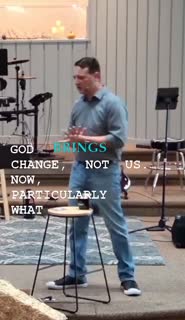Divine Transformation: Trusting God for Spiritual Change
Devotional
Sermon Summary
Bible Study Guide
Sermon Clips
1. "God brings change, not us. Now, particularly what we're addressing here as we talk about this change is the spiritual change that God brings about in people's lives. The miraculous works, the amazing works that God does even in and through His people. This is change that God brings. Now, some of you are going to say, well, I don't know. Sometimes in life, there are situations that need to change, that we need to be the one that prompts that change. But our topic today, our topic today is in spiritual things." [35:20] (36 seconds)
2. "God's the one who brings change. God's the one who's at work. God's the one who does these things. And bad things happen when we try to step in and do God's work for Him. And so we're going to look at Paul. in Ephesus. The whole chapter is the church in Ephesus, but we're looking at Paul in Ephesus here to begin with. And that's verses 1 to 22. And so, we're going to take it a chunk at a time." [35:20] (24 seconds)
3. "This is not something Paul is doing to try and gain fame or fortune for himself. That's important for us to note. This reminds us back a few chapters ago, Peter, right? As Peter is walking through town, as his shadow falls on people, they're healed. Like, what in the world? This is something God is doing to demonstrate himself. This is something God is doing in Ephesus to demonstrate his power. This is something God is doing in Ephesus to the validity of the message, the validity of the gospel and salvation that comes through the person of Jesus Christ." [48:53] (36 seconds)
4. "The sons of Sceva tried to do what they wanted to do to force change. We see in the beginning of the chapter, Paul's not trying to force change on those disciples, the 12, who only have the baptism of John. He follows the pattern, or maybe Aquila and Priscilla follow his pattern that they learned from him, but he follows the pattern that we see in chapter number 18 where he teaches. He doesn't say, oh, what in the world? You only have the baptism of John. You need the baptism of Jesus. What's wrong with you people? He takes them where they are with what they know, and he teaches them the next step." [52:21] (32 seconds)
5. "This is true conversion, abandoning of the old, abandoning of what they believed and followed before, and they're fully following Christ. They're fully practicing the gospel of Jesus Christ and what that means to follow Him. So, it says that they, they came and they burned all of these books, valued at 50,000 drachma. Drachma is a day's wage. 50,000 days of pay is what this is. So, if we're going to put that into today's numbers, the average daily wage in the United States is just under $38 a day." [58:02] (39 seconds)
6. "God brings change, not us. God is the one who works in people's hearts and people's lives, not us. But we can keep telling people about Jesus. We can keep pointing people to Jesus. We can keep instructing people in what's true, knowing that God is the one who's going to work." [01:00:16] (22 seconds)
Ask a question about this sermon
2. "God's the one who brings change. God's the one who's at work. God's the one who does these things. And bad things happen when we try to step in and do God's work for Him. And so we're going to look at Paul. in Ephesus. The whole chapter is the church in Ephesus, but we're looking at Paul in Ephesus here to begin with. And that's verses 1 to 22. And so, we're going to take it a chunk at a time." [35:20] (24 seconds)
3. "This is not something Paul is doing to try and gain fame or fortune for himself. That's important for us to note. This reminds us back a few chapters ago, Peter, right? As Peter is walking through town, as his shadow falls on people, they're healed. Like, what in the world? This is something God is doing to demonstrate himself. This is something God is doing in Ephesus to demonstrate his power. This is something God is doing in Ephesus to the validity of the message, the validity of the gospel and salvation that comes through the person of Jesus Christ." [48:53] (36 seconds)
4. "The sons of Sceva tried to do what they wanted to do to force change. We see in the beginning of the chapter, Paul's not trying to force change on those disciples, the 12, who only have the baptism of John. He follows the pattern, or maybe Aquila and Priscilla follow his pattern that they learned from him, but he follows the pattern that we see in chapter number 18 where he teaches. He doesn't say, oh, what in the world? You only have the baptism of John. You need the baptism of Jesus. What's wrong with you people? He takes them where they are with what they know, and he teaches them the next step." [52:21] (32 seconds)
5. "This is true conversion, abandoning of the old, abandoning of what they believed and followed before, and they're fully following Christ. They're fully practicing the gospel of Jesus Christ and what that means to follow Him. So, it says that they, they came and they burned all of these books, valued at 50,000 drachma. Drachma is a day's wage. 50,000 days of pay is what this is. So, if we're going to put that into today's numbers, the average daily wage in the United States is just under $38 a day." [58:02] (39 seconds)
6. "God brings change, not us. God is the one who works in people's hearts and people's lives, not us. But we can keep telling people about Jesus. We can keep pointing people to Jesus. We can keep instructing people in what's true, knowing that God is the one who's going to work." [01:00:16] (22 seconds)






